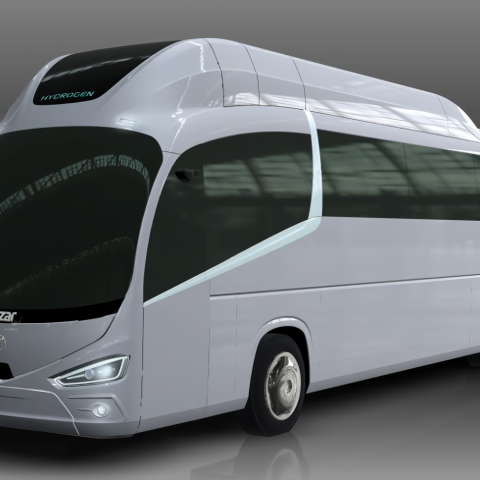It looks like Irizar will bring a fuel cell coach on the market soon
Among the finalists for the Sustainable Bus Awards 2024, one model stands out: the Irizar i6S Efficient Hydrogen. Nobody has never heard of it before. Picture was provided by the Basque group a couple days ago and included in the communication materials released by the award’s organization. No further information have been made public so […]

Among the finalists for the Sustainable Bus Awards 2024, one model stands out: the Irizar i6S Efficient Hydrogen. Nobody has never heard of it before. Picture was provided by the Basque group a couple days ago and included in the communication materials released by the award’s organization. No further information have been made public so far, but it’s not difficult to look back and guess where such project may come from.
As proved by the plans put in place by most of the heavy-duty truck players, hydrogen fuel cell technology is gaining ground as the preferred option for the ‘post-diesel’ future in long-haul operations (with MAN at the moment on a quite different position…). According to a report by Interact Analysis, 74% of coaches are estimated to be non-electrified in 2030 in EMEA region. In that segment, for a few years we’ll mostly see plans, targets and pilot projects.
Irizar i6S Hydrogen: European projects on fuel cell coaches
In Europe, three initiatives focused on the development of fuel cell coaches have been announced so far. Firstly, FlixBus launched the HyFleet project in collaboration with partners Freudenberg Fuel Cell e-Power Systems and ZF in 2021. The project aims to conduct research and advance fuel cell technology. Goal: having hydrogen long-distance buses on the European network by 2024. The minimum range request is 450 km on a single refilling. “A European bus manufacturer will also join the project in the future”, it was stated at the time.
In a February 2022 interview with Sustainable Bus magazine, Michael Milch, Director of Program Management at Freudenberg Fuel Cell e-Power Systems GmbH, emphasized FlixBus’s recognition of the necessity to adapt fuel cell technology for heavy-duty applications. Milch highlighted that the existing fuel cell technology primarily stems from passenger car technology, with a typical lifetime of 5,000 to 8,000 hours. However, the heavy-duty sector demands higher durability: he says that Freudenberg has developed a dedicated heavy-duty design approach to meet this requirement, targeting a minimum lifetime of 35,000 hours.
Secondly, the CoacHyfied project, led by the service provider FEV Group, was launched in March 2021. With partners including Ballard Power Systems, ElringKlinger, Otokar, Engie, and Ford Otomotiv Sanayi A.Ş, a Turkish Ford subsidiary, the project brings together expertise from various sectors to drive advancements in fuel cell technology. The total project duration is scheduled for five years. In the course of CoacHyfied project, two types of coaches will be investigated: OEM-based, newly produced fuel cell buses, and existing buses that have been converted to fuel cell propulsion.
Lastly, Daimler Buses has announced its intention to offer all-electric coaches under its Mercedes-Benz and Setra brands by the end of this decade. To accelerate the development process, Daimler Buses has formed the Electrified Coach project (ELCH) in collaboration with research institutes and industry experts. The project, funded by Germany’s Federal Ministry for Economic Affairs and Climate Action, aims to create a modular drivetrain and develop two emission-free demonstration vehicles within the next four years.
Irizar i6S Efficient Hydrogen on the launching pad
Let’s come to Irizar fuel cell coach Irizar i6S Efficient Hydrogen. The group has submitted this model for consideration in the open call that initiates the Sustainable Bus Award each year.
Although this has not been stated neither confirmed by the OEM or other partners, seems likely to be included in the HyFleet project by Flixbus, as the manufacturer’s name is still unknown.
The dates are aligned: the rules of the Sustainable Bus Award stipulate that the nominated models must be on the market by the end of the year to which the award edition refers (the SBY 2024 will be awarded in October at Busworld Europe). The FlixBus project aims to have hydrogen long-distance buses operating on the European network by 2024.







